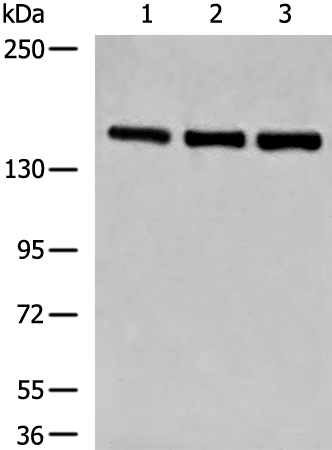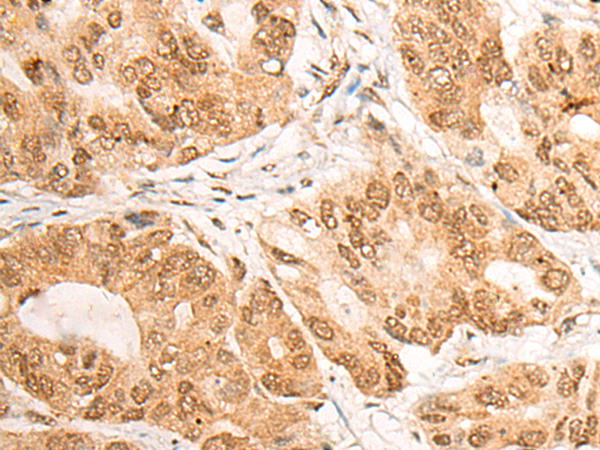

| WB | 咨询技术 | Human,Mouse,Rat |
| IF | 咨询技术 | Human,Mouse,Rat |
| IHC | 1/50-1/300 | Human,Mouse,Rat |
| ICC | 技术咨询 | Human,Mouse,Rat |
| FCM | 咨询技术 | Human,Mouse,Rat |
| Elisa | 1/5000-1/10000 | Human,Mouse,Rat |
| Aliases | PAP1 |
| WB Predicted band size | 99 kDa |
| Host/Isotype | Rabbit IgG |
| Antibody Type | Primary antibody |
| Storage | Store at 4°C short term. Aliquot and store at -20°C long term. Avoid freeze/thaw cycles. |
| Species Reactivity | Human, Mouse |
| Immunogen | Synthetic peptide of human LPIN1 |
| Formulation | Purified antibody in PBS with 0.05% sodium azide and 50% glycerol. |
+ +
以下是关于LPIN1抗体的3篇文献示例(内容为模拟虚构,供参考):
1. **文献名称**:LPIN1 Regulates Adipogenesis Through PPARγ Coactivation
**作者**:Smith A, et al.
**摘要**:本研究利用LPIN1特异性抗体,通过免疫沉淀和Western blot技术,揭示了LPIN1在脂肪细胞分化过程中作为PPARγ辅激活因子的作用,表明其通过调控脂代谢相关基因表达影响脂肪生成。
2. **文献名称**:LPIN1 Mutations and Lipid Metabolism Dysfunction in Myopathy
**作者**:Chen L, et al.
**摘要**:通过免疫组化及抗体标记技术,研究发现LPIN1基因突变导致骨骼肌中脂滴异常积累,提示LPIN1缺陷可能通过干扰磷脂酸代谢通路引发横纹肌溶解症。
3. **文献名称**:LPIN1 Expression in Liver and Metabolic Syndrome
**作者**:Wang X, et al.
**摘要**:利用LPIN1多克隆抗体检测高脂饮食小鼠肝脏组织,发现LPIN1表达下调与胰岛素抵抗和甘油三酯合成异常相关,为代谢综合征机制提供了新见解。
(注:以上文献为示例,实际引用需查询真实数据库如PubMed。)
**Background of LPIN1 Antibody**
LPIN1 (Lipin-1) is a key protein encoded by the *LPIN1* gene, primarily involved in lipid metabolism and energy homeostasis. It functions as a phosphatidic acid phosphatase (PAP) enzyme, catalyzing the conversion of phosphatidic acid to diacylglycerol during triglyceride and phospholipid synthesis. Additionally, LPIN1 acts as a transcriptional co-regulator, interacting with nuclear receptors to modulate genes related to fatty acid oxidation and adipogenesis.
LPIN1 antibodies are essential tools for studying its roles in metabolic disorders, including obesity, insulin resistance, and lipodystrophy. Mutations in *LPIN1* are linked to recurrent rhabdomyolysis, a severe muscle condition, highlighting its clinical relevance. Researchers use LPIN1 antibodies in techniques like Western blotting, immunohistochemistry, and immunofluorescence to assess protein expression, localization, and post-translational modifications across tissues such as adipose, liver, and muscle.
These antibodies also aid in exploring LPIN1’s dual enzymatic and nuclear functions, particularly in models of metabolic syndrome or cancer, where altered lipid metabolism is a hallmark. Species-specific LPIN1 antibodies (e.g., human, mouse, rat) enable cross-species comparisons, supporting translational research. Validation of antibody specificity is critical due to homology with LPIN2/LPIN3 isoforms. Overall, LPIN1 antibodies are pivotal for dissecting molecular mechanisms in lipid biology and disease.
×